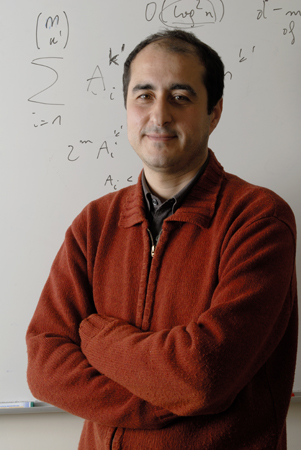Keynote Speakers
- Anna Karlin, University of Washington, USA.
- Paul Klemperer, University of Oxford, UK.
- Stefano Leonardi, Sapienza University of Rome, Italy.
- Noam Nisan, Hebrew University of Jerusalem, Israel.
Keynote Talk by Anna Karlin
Anna Karlin, The University of Washington, USA.
Title: Combinatorial Auctions with Interdependent Valuations

We consider social welfare maximization in combinatorial auctions when values are interdependent. In such settings, each agent receives a set of signals drawn from a correlated distribution and each agent's value for a subset of goods is a function of signals of all other agents. This model is intended to capture the value of resale and the aggregation of information different agents have about the goods being sold. We present conditions under which social welfare can be approximated with an ex-post incentive compatible mechanism. Joint work with Alon Eden, Michal Feldman, Amos Fiat and Kira Goldner.
Short bio: Anna R. Karlin, is the Microsoft Professor of Computer Science and Engineering at the Paul G. Allen School of Computer Science at the University of Washington. She received her Ph.D. from Stanford University in 1987. Before coming to the University of Washington, she spent 5 years as a researcher at (what was then) Digital Equipment Corporation's Systems Research Center. Her research is primarily in theoretical computer science: the design and analysis of algorithms, particularly algorithmic game theory, probabilistic and online algorithms. She is coauthor of the book “Game Theory, Alive” with Yuval Peres, published in 2017 by the American Mathematical Society. She is a Fellow of the Association for Computing Machinery and a member of the American Academy of Arts and Sciences.
Keynote Talk by Paul Klemperer
Paul Klemperer, The University of Oxford, UK.
Title: Art of Designing Practical Multi-Product Auctions

I'll talk about my and co-authors' work developing and analysing practical multi-product auctions. I’ll start with the auction I developed at the beginning of the financial crisis (2007-8) to help the Bank of England (who still use it regularly). I’ll then describe related work. The more recent work is joint with Elizabeth Baldwin and, in part, with Paul Goldberg and Edwin Lock
Short bio: Paul Klemperer is an economist and the Edgeworth Professor of Economics at Oxford University. He is a leading expert on auctions, the economics of climate change, and competition policy, and has advised EU, US, UK and other governments on such matters. He was the principal auction theorist for the UK's 3G mobile-phone licence auction which raised £22.5bn in 2000 and in 2002 he was one of those who advised the UK government on the world's first auction for greenhouse gas emissions reductions. He is an adviser to the Bank of England and invented the Product-Mix Auction which is now used regularly by the Bank. He was a member of the UK Competition Commission (2001-2005) and remains on its Panel of Economic Advisers.
Keynote Talk by Stefano Leonardi
Stefano Leonardi, Sapienza University of Rome, Italy.
Title: Algorithmic Mechanism Design for Two-sided Markets

Mechanism design for one-sided markets is an area of extensive research in economics and, since more than a decade, in computer science as well. Two-sided markets, on the other hand, have not received the same attention despite the many applications to Internet advertisement and to the sharing economy. Both buyers and sellers act strategically. An ideal goal in two-sided markets is to maximize the social welfare of buyers and sellers with individually rational (IR), incentive compatible (IC) and budget-balanced mechanisms (BB), which requires that the mechanism does not subsidize the market or make an arbitrary profit from the exchange. Unfortunately, Myerson and Satterthwaite proved in 1983 that this goal cannot be achieved even in the bayesian setting and for the simple case of only one buyer and one seller. In this talk, I’ll discuss meaningful trade-offs and algorithmic approximations of the above requirements by presenting several recent results and some challenging open problems.
Short bio: Stefano Leonardi is currently a full professor at Sapienza University of Rome. He has authored more than 120 publications in leading international conferences and journals in the areas of the design of online and approximation algorithms, algorithmic game theory and mechanism design, Web search and mining. He is also a winner of a Google Faculty Award and a co-winner of a Google Focused Research Award. He has served on the program committees of leading international conferences on algorithms, economics and computation and web technologies. He served in 2005 as Program Chair of the European Symposium on Algorithms (Design and Analysis Track). He is on the editorial board of the ACM Transactions on Algorithms. In 2009 he chaired the 5th Workshop on Internet and Network Economics. In 2013 he was the main organizer of the ACM International Conference on Web Search and Data Mining (WSDM) held in Rome and in 2015 one of the organizers of the WWW conference to be held in May 2015 in Florence.
Keynote Talk by Noam Nisan
Noam Nisan, The Hebrew University of Jerusalem, Israel.
Title: Pricing Complexity

As economic systems "move" to the Internet, they may become much more complex, and this new complexity often becomes their defining characteristic. We will consider a very simple scenario of this form: a single seller that is selling multiple items to a single buyer. We will discuss the question of how *complex* must the pricing scheme be in order for the seller to maximize (approximately, at least) his revenue. Based on joint works with Sergiu Hart, with Shaddin Duhgmi and Li Han and with Moshe Babioff and Yannai Gonczarowski.
Short bio: Noam Nisan is a Professor in the School of Computer Science and Engineering and at the Center for the Study of Rationality of the Hebrew University and is a Principal Researcher in Microsoft. He has received his PhD in Computer Science from UC Berkeley and has also worked as a researcher at Google. He is interested in a variety of issues on the border of Computer Science and Economic Theory and specifically in various forms of electronic markets and auctions.





